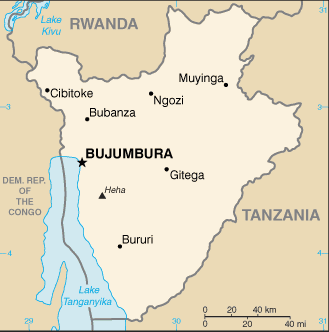Burundi

The Republic of Burundi has an estimated population of 8.5 million (UN, 2010). The capital is Bujumbura. Burundi has an area of 27,816 sq km (10,740 sq miles). The main languages are Kirundi (official), French (official), and Swahili.
Burundi became independent in 1961. Soon after independence, widespread ethnic violence between the dominant minority Tutsi and the Hutu flooded the country for nearly 12 years. Up to 200,000 people died in the Burundi civil war, which began in 1993, and hundred of thousands of people were internally displaced. The country is now recovering from the 12 years civil war after a ceasefire agreement in 2008.
Sexual violence and domestic violence, among other forms of violence, are widespread in Burundi due to the discriminatory Government legislation. Despite the introduction of free primary education in 2005, there is still a disparity between boys and girls mainly in secondary and higher education.
- Burundi signed the Protocol to the African Charter on Human and Peoples' Rights on the Rights of Women in Africa (The Maputo Protocol) on the 3rd of December 2003 but has not ratified it.
- The Convention on the Elimination of All Forms of Discrimination against Women (CEDAW) was ratified by Burundi on the 8th of January 1992.
- Burundi has not yet adopted a National Action Plan on United Nations Security Council Resolution 1325 (UNSCR 1325).
- From June 2004 to December 2006, there was a UN peacekeeping mandate in Burundi: United Nations Operations in Burundi (ONUB).
